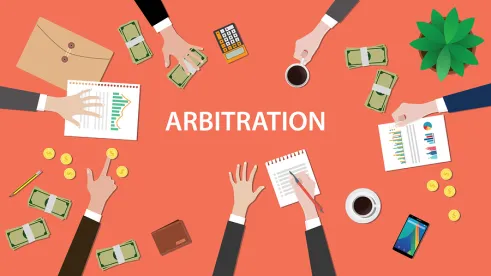The U.S. Code contains a longstanding and – until recently – uncontroversial tool to assist in proceedings before a "foreign or international tribunal." Then, in just the past nine months, at least six landmark decisions have come out of U.S. circuit and district courts around the country, creating a controversy likely headed for the U.S. Supreme Court.
The Code section, 28 U.S.C. § 1782, allows U.S. district courts, upon application by a party in an international proceeding, to compel discovery from a non-party so long as the non-party person or entity resides or does business in the jurisdiction of the U.S. district court where the application is made. However, about half of the recent cases hold that this discovery tool is not available in private international commercial arbitrations. The other half say that it is.
Therefore, this valuable or vexing (depending on your perspective) tool in commercial arbitration could be solidified – or it could be eliminated. As always, the Supreme Court could decline to get involved, leaving the tool in place in some U.S. locations.
Section 1782 Is Not Available in Private Arbitrations
Since 1999, when the Second Circuit, in National Broadcasting Co., Inc. v. Bear Stearns & Co., Inc., 165 F.3d 184 (2nd Cir. 1999) and the Fifth Circuit, in Republic of Kazakhstan v. Biedermann Int’l, 168 F.3d 880 (5th Cir. 1999), decided that section 1782 is not meant to be used in private commercial arbitrations, no one really challenged that position. The only U.S. Supreme Court decision to come close to the issue was Intel Corp. v. Advanced Micro Devices, Inc., 542 U.S. 241 (2004) in which the U.S. Supreme Court, relying heavily on legislative history, held that a section 1782 application is available in arbitrations that are state-to-state arbitrations, but it left open the question of whether section 1782 is available for parties in investor-state or private commercial arbitrations.
In the past 20 years, several U.S. district courts have handled section 1782 applications arising out of international arbitrations, but they have spent their energy debating whether the particular arbitration qualified as a state-sponsored arbitration. If not, assistance was not provided. Then, last year, a full-out attack erupted on the judicially created exclusion of private commercial arbitrations from the section 1782 assistance. At least four cases have been appealed from the U.S. district courts to their circuit courts of appeal, and a clear circuit split has developed.
Second and Fifth Circuits vs. Sixth and Fourth Circuits
On September 19, 2019, in the case of Abdul Latif Jameel Transp. Co. v. FedEx Corp., 939 F.3d 710 (6th Cir. 2019) the Sixth Circuit broke away from the long-held positions of the Second and Fifth circuits and instead held that – pursuant to the plain meaning of the word “tribunal” – the district courts’ section 1782 authority extends to supporting all international arbitral tribunals. Just a few months later, the Fourth Circuit agreed in Servotronics Inc. v. Boeing Co., 954 F.3d 209, 216 (4th Cir. 2020), pointing out that it was basing its decision on the plain meaning of the word “tribunal.”
Not to be undone, the Second Circuit put to rest considerable criticism that was being leveled at its 1999 decision, in a decision it rendered on July 8, 2020, Hanwei Guo v. Deutsch Bank Securities, Inc., Case No 19-781 (2nd Cir. 2020). There, the Second Circuit held in no uncertain terms that its 1999 decision was still good law and that the legislative history examined by the U.S. Supreme Court in Intel did not suggest that section 1782 assistance should be allowed for just any private arbitration in which contracting parties wanted to engage.
Other Circuits Join the Fight
At the same time that it filed its successful section 1782 application in South Carolina, Servotronics filed a twin application for other discovery located in Illinois. There it was unsuccessful, and so Servotronics has appealed that decision to the Seventh Circuit Court of Appeals.
Meanwhile, on February 25, 2020, the U.S. District Court for the Northern District of California, a district important as the hub of the U.S. high tech industry, ruled that section 1782 assistance extends to supporting all arbitral tribunals, including a private China International Economic and Trade Arbitration Commission (CIETAC) arbitration. HRC-Hainan Holding Company, LLC v. Yihan Hu, et al., Case No. 19-mc-80277-TSH (N.D. Cal. 2020). Three weeks later, the Delaware District Court took the opposite view in EWG Gasspeicher GMBH v. Halliburton Co., Case No. 20-1830 (D Del. 2020). These cases both have been noticed for appeals in the Ninth and Third circuits.
The Supreme Court
Currently, the only case teed up for possible consideration next year by the U.S. Supreme Court is the Servotronics case from the Fourth Circuit that allowed discovery under section 1782 in a commercial arbitration. If heard, Servotronics could clear up this confusion. If such a petition is declined or not filed, the issues surrounding section 1782 will remain undecided, and arbitral parties probably can continue to shop for friendly circuits in which to seek and likely get the discovery they want.
What Are the Practical Implications for International Arbitrations?
As usual, it depends. For arbitral parties that anticipate a need for discovery from a nonparty with a U.S. relationship, section 1782 is usually seen as a valuable tool. For parties seeking to block such discovery, section 1782 is seen as presenting an affront to what is expected and maybe even what was bargained for in arbitration clauses – a streamlined proceeding.
For litigants in the former category, section 1782 should be kept in mind as a useful tool, and U.S. counsel should be consulted as to when and where to proceed. Those in the latter category should try negotiating a prohibition in their arbitration procedural order on the use of 28 U.S.C. § 1782 discovery applications for the proceeding.




 />i
/>i

